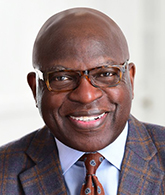With Virgil Fludd
Last month I talked about not feeling like I belonged when I was a student at Davidson College in the late 70s and that it is on us as leaders to make people feel like they truly belong where we are, as opposed to just being a curiosity.
Lately, I’ve been thinking about why it’s important to cultivate a sense of belonging. I was watching a segment about the NBA playoffs on ESPN back in May, and there was a female reporter whose granular commentary demonstrated a deep understanding of the game. It was fascinating to me, because seven or eight years ago I would have thought it was odd, but this felt as though ESPN has created a space for her to feel like she belongs. And she was using it in a way that reaffirmed that she belonged, that she was not out of place, that she understood the nuances of not just the game of basketball, but the art of being a reporter on television, and the conversation and commentary was all the better for it.
I would be remiss in not commenting on the recent Supreme Court decision regarding affirmative action. I am sure that most of you are aware of the ruling, so I won’t restate all the comments that have been made in the media and elsewhere. I would say that two things stuck out to me. The first is the exception granted to military academies. The court recognized the importance of diversity in the armed forces and allowed the continued use of race in their admissions process. It begs the question of “if it makes sense for the military, why is it not good for the rest of the country?” It is also noteworthy that preferences for athletes, legacies, wealthy donors and children of faculty were not addressed. The second thought to me was the implication of that decision may extend beyond higher education. The new ruling could stifle companies’ ability to consider racial diversity in hiring. We have already seen a decline in the endorsement of DEI efforts in the past few years. This decline in support for inclusion and belonging work has many minority and women leaders wondering about the future of these initiatives at their companies.

On campuses, the college experience shapes who students become for the rest of their lives. If we want them to be leaders in our communities across whatever spectrum, they need to be given an opportunity to develop their entire persona. This is only possible if we work to ensure that we’re sending them into environments that allow them to bring their true and full self in order to do the work.
For corporations, what I’ve seen is that most tend to be fairly diverse at the entry levels, but not so much at the executive levels. The challenge is getting the better, more significant roles in the organization to reflect the diversity of the customers and the markets that they serve. I think the best place to start changing this is by building a talent pipeline that includes diverse candidates. While it is crucial to welcome a diverse talent pool into an organization, it is equally important to have that diversity reflected throughout the organization.
I’ll be back next month to talk about the challenges in fostering a sense of belonging. I hope to hear back from you on your thoughts on these ideas – it’s by conversing about things that we all become more comfortable.
Read last month’s edition of Thoughts on Belonging With Virgil Fludd here.

Virgil Fludd resides in Atlanta and is a partner in the Academic, Non-Profit, Social Enterprise and Culture Practice. He has over three decades of executive search experience and is a trusted advisor to organizations seeking operational and cultural excellence.